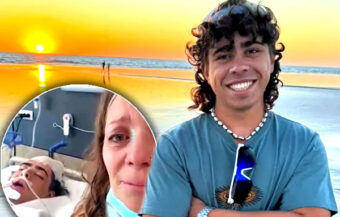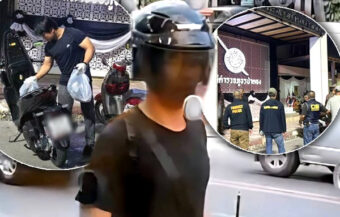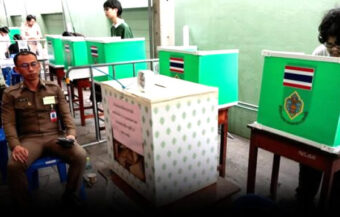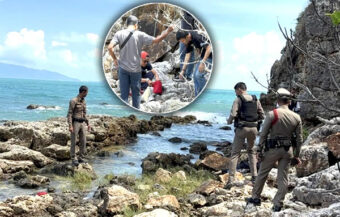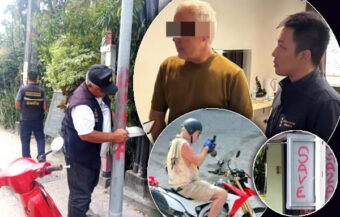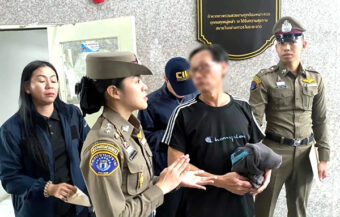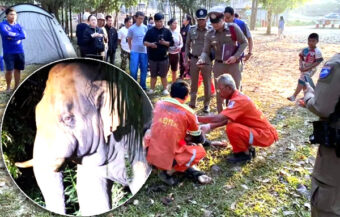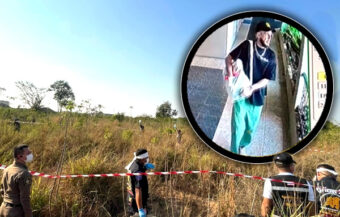Desperate wildlife teams launch an intense rescue for Khao Tom, a newborn elephant abandoned in Kanchanaburi after her mother left her weak body behind, as veterinarians and volunteers race against time to provide round-the-clock care and a chance to survive.
A desperate wildlife rescue is underway in Kanchanaburi after a mother elephant abandoned her weak newborn during the herd’s weekend migration. The tiny female calf was found alone in a forest in Chalae subdistrict on Monday. She has been named Khao Tom by her rescuers, who are fighting against the odds to keep her alive. Right now, her chances are slim, if her mother’s instincts—normally flawless—are correct.
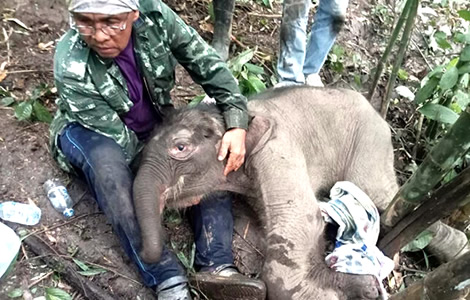
Thai wildlife officials are providing urgent care to a newborn elephant calf found abandoned in Lam Khlong Ngu National Park. The calf, just a day old, was discovered alone on September 22 in the forest near Huai Suea village, Chalae subdistrict, Thong Pha Phum district. Immediately, park officials, Buddhist monks, village volunteers, and elephant monitoring teams launched a rescue operation.
The calf, a female, was born at 2:30 p.m. on September 21. Her mother, a 20-year-old elephant named Mae Suksant, reportedly abandoned her because she appeared too weak. Consequently, the mother followed her herd toward Thungyai Naresuan Wildlife Sanctuary.
Experts explain why the mother elephant left the weak calf behind as it could not survive the herd journey alone
“The mother elephant left the calf behind because it was not strong after birth,” explained Prathom Han Klang, an elephant behaviour expert at the Elephant Conservation Foundation. He added that wild elephants sometimes leave newborns when survival seems unlikely.
Rescue teams immediately named the calf Khao Tom, which means Rice Porridge. Officials warned that the newborn’s survival chances remain low. Nevertheless, caregivers are determined to provide every possible opportunity for recovery.
The calf was transported to the Forest Protection Unit under the supervision of Akkanit Klangpraphan, head of Lam Khlong Ngu National Park. Veterinarians discovered that she suffers from general weakness and a right hind leg injury.
This injury prevents her from standing without assistance. Consequently, the rescue became a delicate, around-the-clock operation.
Care teams provide round-the-clock monitoring and feeding to help the calf recover from leg weakness
Meanwhile, elephant supporter Kanchana Silpa-archa, advisor for the Chartthaipattana Party, said the calf initially received rice water and infant formula. Later, caregivers switched to a more suitable Enfalac milk formula.
Additionally, elephant mother’s milk was donated from Wang Chang Lae Paniat elephant camp in Ayutthaya province. Officials stressed that milk collection and transport require precise hygiene and temperature control. Any errors could prove fatal.
During the night, care teams closely monitored Khao Tom’s condition. At 11:30 p.m., she drank a large amount of rice water. Then, at 3:00 a.m., officials fed her an additional 300 millilitres. She urinated 30–50 millilitres, indicating normal bodily functions.
However, her injured leg remained unable to support her weight. By 6:00 a.m., caregivers provided another 600–700 millilitres of milk. Gradually, the calf attempted to sit up independently, though staff continuously assisted her to prevent bloating caused by lying too long.
Veterinarians continue to assess injuries and develop plans as the calf struggles to stand despite 24-hour care
Despite multiple attempts, Khao Tom cannot yet stand. Veterinarians continue assessing the leg injury and developing treatment plans to help her walk. This case highlights the harsh realities of wild elephant survival. Mothers sometimes face impossible decisions, leaving vulnerable calves entirely dependent on humans.
Later on September 22, Khao Tom was transferred to Bueng Chawak Wildlife Management Development Centre in Suphan Buri Province.
There, she is under the care of Dr. Phatthraphon Mani-on, Head of Wildlife Health Management at the Wildlife Conservation Office. Dr. Mani-on posted a video of the calf in transit. He described her as playful, flapping her ears while staff attended to her.
Officials emphasised that each feeding, movement, and treatment must be carefully controlled. Any mistakes could worsen her condition. In addition, the calf’s fragile state requires constant monitoring and patience. Care teams adjust feeding schedules and medical interventions based on her daily progress.
Coordinated efforts show the dedication required to meet the medical needs of a fragile newborn elephant
The rescue of Khao Tom exposes the delicate balance in Thailand’s wild elephant population. Habitat fragmentation and natural pressures force mothers to leave weak offspring behind.
Consequently, human intervention sometimes becomes the only way to save newborns. Experts insist that such cases demand specialised veterinary care and constant supervision.
This rescue also spotlights the extraordinary effort required to save even one abandoned elephant. Park officials, volunteers, monks, and donors worked together seamlessly. They ensured transport, milk provision, and medical care occurred without delay. Their coordinated efforts gave Khao Tom her first chance at survival.
The calf’s progress, although slow, shows promise. She has begun showing strength in her upper body and attempts small movements independently.
Caregivers assist with leg exercises and proper positioning to avoid complications from prolonged lying. Meanwhile, officials continue to monitor hydration, digestion, and feeding responses closely.
Khao Tom’s story highlights elephant vulnerability and the vital role of human intervention for calf’s survival
Khao Tom’s story resonates beyond this single rescue. It highlights the vulnerability of wild elephants, the difficult choices mothers face, and the critical role humans play in conservation.
Without intervention, weak newborns rarely survive in the wild. Conversely, with proper care, even the most fragile calves can have a fighting chance.
22-year-old Spanish tourist gored to death on Ko Yao by an elephant she was bathing on Friday afternoon
Elephant pants should be a Thai success story. Instead, it is a story of economic policy failure as manufacturing slips
Thailand brings in elephant patrols to protect tourists in Ayutthaya as visitor numbers fall
For now, Khao Tom’s condition remains critical but stable. Her caretakers remain vigilant, knowing each day is vital. The rescue demonstrates the dedication and expertise required to safeguard Thailand’s elephants. It also emphasises the broader challenges facing the country’s wildlife amid shrinking forests and human encroachment.
Certainly, Khao Tom’s struggle is both a warning and a testament. It warns of the fragility of wild species and their dependence on intact habitats. Yet it also shows the remarkable dedication of humans willing to intervene. As she grows, every milestone will be closely watched, celebrated, and documented by the teams who saved her.
Join the Thai News forum, follow Thai Examiner on Facebook here
Receive all our stories as they come out on Telegram here
Follow Thai Examiner here
Further reading:
Concerns raised about EV vehicles and batteries stored in Bangkok after intense Chatuchak fire
Thailand faces an economic test as change becomes a reality in cars, farming and business
Friday evening horror smash in southern Thailand wipes out family riding pillion on a motorbike

